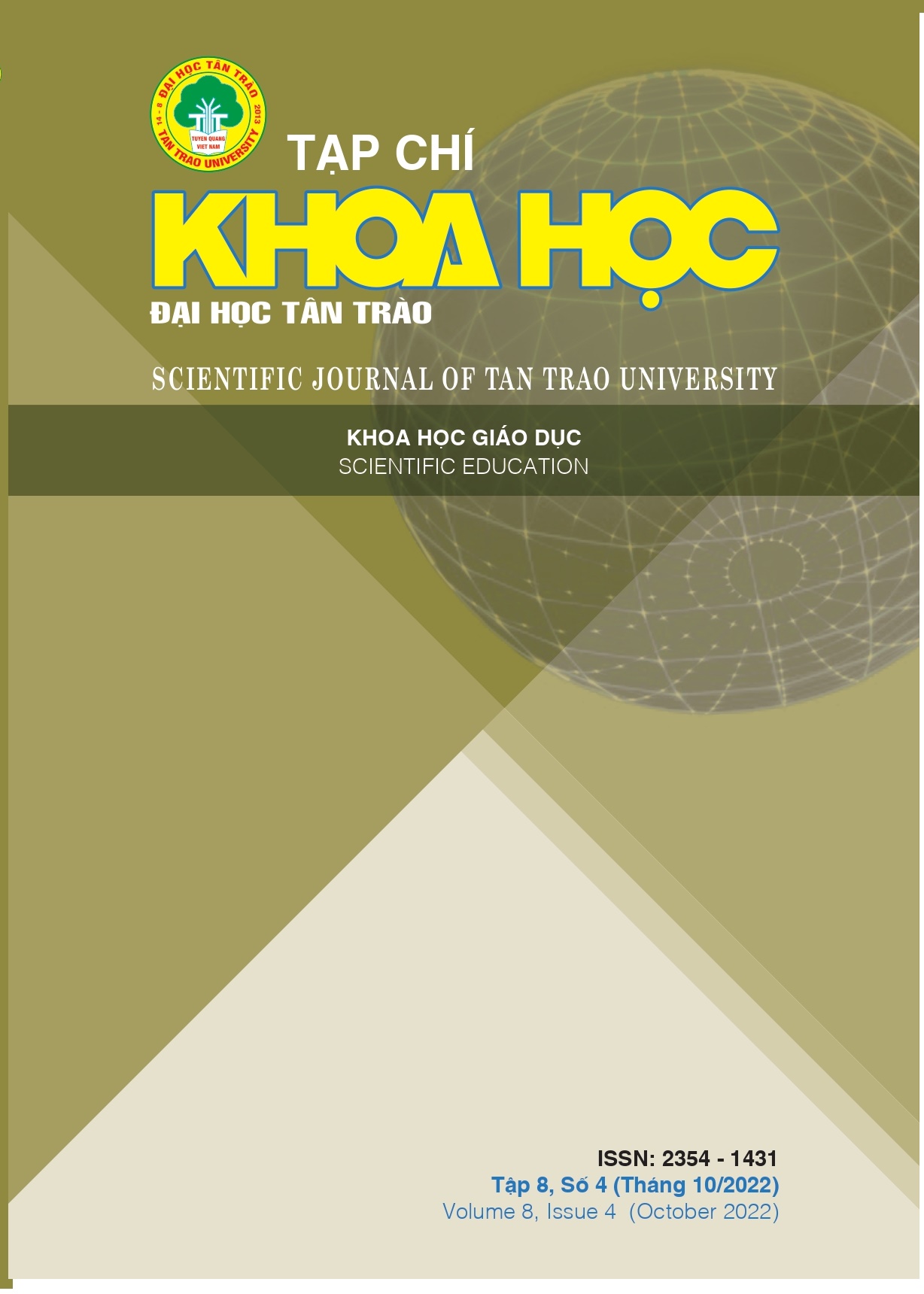THỰC TRẠNG GIÁO DỤC KỸ NĂNG GIAO TIẾP CHO TRẺ MẪU GIÁO 5-6 TUỔI THEO CHỈ ĐẠO KINH NGHIỆM Ở CÁC TRƯỜNG MẦM NON THÀNH PHỐ THÁI NGUYÊN
DOI:
https://doi.org/10.51453/2354-1431/2022/830Từ khóa:
kỹ năng giao tiếp, giáo dục kỹ năng, trẻ mầm non, hoạt động trải nghiệm.Tóm tắt
Việc nghiên cứu và thực hiện các biện pháp tổ chức giáo dục kỹ năng giao tiếp cho trẻ theo hướng trải nghiệm không chỉ góp phần nâng cao kỹ năng giao tiếp cho trẻ mẫu giáo (5–6 tuổi) mà còn từng bước nâng cao chất lượng chăm sóc giáo dục trẻ tại nhà trường . Vì vậy, chúng tôi tiến hành khảo sát 552 trẻ mẫu giáo và 45 cán bộ quản lý, giáo viên mầm non để làm rõ thực trạng giáo dục kỹ năng giao tiếp cho trẻ mẫu giáo 5-6 tuổi theo hướng trải nghiệm ở các trường mầm non Thành phố Thái Nguyên.
Tải xuống
Tài liệu tham khảo
[1] Hoan, V.T. (2017), Pedagogical communication skills of teachers with preschoolers and evaluation criteria, Journal of Education, no. 409, pp. 21-24.
[2] Hong, L.X. (2004), Some issues of communication and pedagogical communication in the activities of preschool teachers, Education Publishing House, Hanoi.
[3] Luan, L.T. (2019), Some notes in the communication skills training of preschool teachers, Journal of Education, no. 458, pp. 16-19.
[4] Nam, N.G. (2013), Communication skills education for northern mountainous rural students, PhD thesis, Thai Nguyen University.
[5] Thanh. N.T. (2014), Measures to develop communication skills for autistic children 3-4 years old, PhD thesis in Educational Sciences.
[6] Thuy, V.T. (2018), The situation of communication skills of preschoolers 5-6 years old through role-playing games in preschools in the northern mountainous region of Vietnam, Education Magazine, Special issue, September 2018, pp. 253-256; 207
Tải xuống
Đã Xuất bản
Cách trích dẫn
Số
Chuyên mục
Giấy phép

Tác phẩm này được cấp phép theo Giấy phép Quốc tế Creative Commons Attribution-ShareAlike 4.0 .
Bài báo được xuất bản ở Tạp chí Khoa học Đại học Tân Trào được cấp phép theo giấy phép Ghi công - Chia sẻ tương tự 4.0 Quốc tế (CC BY-SA). Theo đó, các tác giả khác có thể sao chép, chuyển đổi hay phân phối lại các bài báo này với mục đích hợp pháp trên mọi phương tiện, với điều kiện họ trích dẫn tác giả, Tạp chí Khoa học Đại học Tân Trào và đường link đến bản quyền; nêu rõ các thay đổi đã thực hiện và các nghiên cứu đăng lại được tiến hành theo cùng một bản quyền.
Bản quyền bài báo thuộc về các tác giả, không hạn chế số lượng. Tạp chí Khoa học Tân Trào được cấp giấy phép không độc quyền để xuất bản bài báo với tư cách nhà xuất bản nguồn, kèm theo quyền thương mại để in các bài báo cung cấp cho các thư viện và cá nhân.
Mặc dù các điều khoản của giấy phép CC BY-SA không dành cho các tác giả (với tư cách là người giữ bản quyền của bài báo, họ không bị hạn chế về quyền hạn), khi gửi bài tới Tạp chí Khoa học Đại học Tân Trào, tác giả cần đáp ứng quyền của độc giả, và cần cấp quyền cho bên thứ 3 sử dụng bài báo của họ trong phạm vi của giấy phép.






